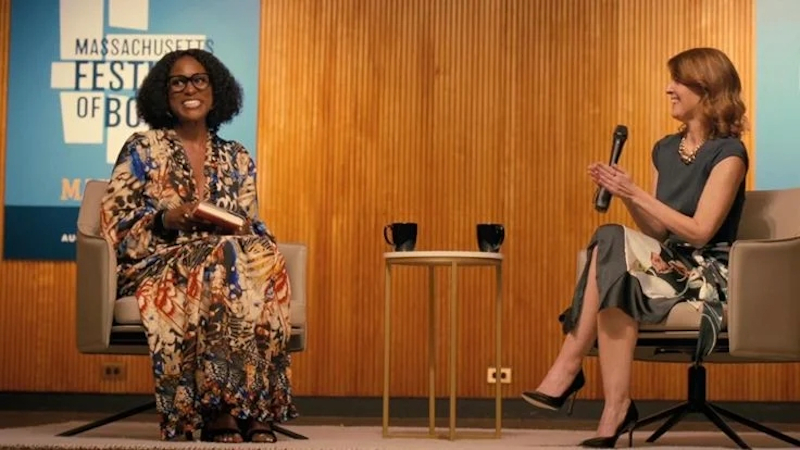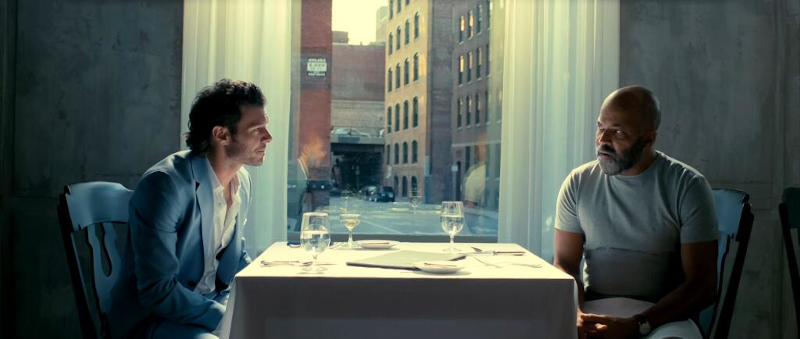Director – Cord Jefferson – 2023 – US – Cert. 15 – 117m
*****
A black, American college Literature professor, unexpectedly finds celebrity via an anonymous alter-ego when he writes a cliché-ridden book about ‘the black experience’ – out in UK cinemas on Friday, February 2nd
College professor Thelonius ‘Monk’ Ellison (Jeffrey Wright) is a black academic at a white university. He teaches literature. While he’s teaching a class on the literature of the American South, a young, white, female student objects to the “N-word”, walks out of the class, and – in due course – gets him put on an unpaid Sabbatical. He’s a published novelist who hasn’t had anything published for years, including a manuscript currently doing the rounds through his agent Arthur, whereas other, white, faculty members publish work he considers beneath him yet which also sell in volume in airports.

His Sabbatical ties in with the fact of his going to a Literature Festival in his home city of Boston, where he finds his seminar poorly attended because it’s up against one by rising publishing sensation Sintara Golden (Issa Rae), author of We’s Lives in Da Ghetto, which, when he investigates her session, turns out to be what he considers pandering to black stereotypes of living in poverty, crime and misery. Golden does not know such worlds from personal experience – she went through university, got a job reading slush piles at a top publisher, worked out what would sell and then wrote it. His own books (“I’m black and it’s my book.”) attempt to do something different, but he’s black, so franchise bookstores file them under black literature where he doesn’t want to be pigeonholed. And incidentally also have big displays of We’s Lives in Da Ghetto.

He doesn’t particularly want to go to Boston because he doesn’t like his family. Or, at least, that’s what he says. His savvy sister Lisa (Tracee Ellis Ross) works as a doctor in a family planning clinic. She’s concerned that their mother Agnes (Leslie Uggams) may be going down with dementia, and the cost of paying for a care home place is more than either she or he can afford. Equally concerned is Agnes’ longstanding and good-hearted housekeeper Lorraine (Myra Lucretia Taylor) who is, to all intents and purposes, another member of the family.
Third sibling Clifford (Sterling K. Brown) has come out as gay, but wishes he’d done so when their father was still alive. A father who, it turns out, had numerous affairs – the self-obsessed Monk seems to be the only family member who didn’t know. Having embraced his gay identity, Clifford is rampantly extrovert about it.
To make life more interesting still, returning to the parental home, Monk strikes up a relationship with Coraline (Erika Alexander), the woman who lives across the road and who is in the process of separating from her partner. It turns out, she has actually read and enjoyed some of Monk’s books.

One of the many pleasures of this highly intelligent film is that it’s constantly firing off in multiple directions based around many of the above characters in Monk’s life, although, happily in this case, not in any way that detracts from the main story (which is what so often happens in and can all too easily ruin a film of this sort). It’s more like, the main story is happening, but while it does so, the protagonist’s life keeps getting in the way.
The main story is this: exasperated by his successful yet pedestrian work colleagues and the high regard in which publishing hold Sintara Golden and her writing, Monk sits down one night and knocks off a parody ‘black’ novel, stuffing in every black racial stereotype he can think of. The writing scene has him at his typewriter while his two characters Willy the Wonka (Keith David) and Van Go Jenkins (Okieriete Onaodowan) play out the dialogue and action in the small room in front of him He then mails the resultant manuscript, entitled My Pafology and written under the pseudonym of Stagg R. Leigh, to his supportive if long-suffering agent Arthur (John Ortiz), as a joke.
No-one is more surprised than Monk when a publisher offers him a huge advance and wants to publish as soon as possible with a massive advertising campaign, believing he’s written a bestseller. His eventual attempts to shut the whole thing down, by renaming the novel Fuck, hilariously fail to alienate white publishing rep Paula Baderman (Miriam Shor) and marketing man John Bosco (Michael Cyril Creighton). Later, when Monk is on the jury for a literary prize with Sintara Golden and three white writers, the three whites (who outnumber the blacks three to two) want Fuck to win the prize.

Monk now finds himself forced to maintain the subterfuge of playing the fictional writer of the novel, expanding Leigh’s persona on TV talk shows into a fugitive from justice, a trait reinforced when, during a meeting with Oscar-bait producer Wiley Valdespino (Adam Brody), he flees the restaurant near his agent’s office at the sound of a police siren, convincing the producer, who claims to have met with numerous fake authors in his time, that Stagg is the real deal. In truth, Monk fears the sirens mean that his dementia-sufferer mother, who came with him, has gone walkabout from Arthur’s office.
Cord Jefferson’s finely crafted adaptation is a gift of a role for Wright, who responds by delivering what I can only describe as a masterclass in acting. Such is Jefferson’s skill at writing characters and then casting them appropriately, that there isn’t a character here that isn’t memorably performed, and the film deserves to become a standard Hollywood casting resource. One should add that Jefferson appears to know how to direct actors to get the best out of them, although getting the writing and the casting correct in the first place always goes a long way to getting the job done well.

The narrative packs its fair share of surprises, including a funeral (complete with a passing busybody inconsiderately objecting to the scattering of human remains in the sea) and a wedding. Towards the close, it even goes so far as to (successfully) incorporate several different endings as Wiley discusses with Monk the possible endings for the proposed film version (a film adaptation of the events within the film, although that, obviously, is already a film in itself).
This compelling piece says things about the perception of black people by the wider American society that have needed saying for a very long time. (And, you could reasonably argue, deals with much wider issues than that as well.) Based on Percival Everett’s 2001 novel Erasure, it’s extremely sharp and well worth two hours of your time. Having now watched it twice, although it impressed first time round, for this writer, at least, it improves quite considerably on a subsequent viewing, not least because there is so much going on in the finer details of the story / stories. All concerned can be very proud of putting this one together: a magnificent and finely crafted exercise in storytelling.
American Fiction is out in cinemas in the UK on Friday, February 2nd.
Trailer:
